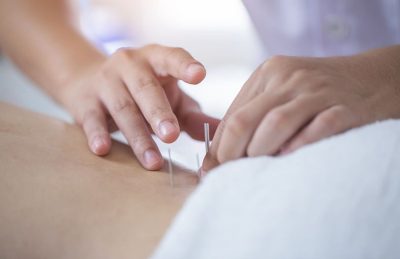Acupucture
Balancing Vital Energy and Enhancing Energy Flow
What is Acupuncture?
Acupuncture is part of the ancient practice of Traditional Chinese medicine (TCM).
TCM believes that the body’s vital energy, Qi, flows along specific channels or meridians. Qi is the life-giving force that sustains us, and it’s responsible for maintaining the harmony of both our mental and physical health.
If the qi is balanced then the person has spiritual, emotional, and physical health. But when the qi isn’t in balance, disease may occur. Qi can be blocked, causing imbalance between the yin and yang.
Acupuncture treatment involves the strategic insertion of very thin, sterile needles into specific points on the body. These points align with meridians or channels through which Qi and blood flows. Then often these points can be stimulated by the practitioner’s hands or through electrical stimulation.
Acupuncture points are believed to stimulate the central nervous system. This releases chemicals into the muscles, spinal cord, and brain. These biochemical changes may stimulate the body’s natural healing abilities. They may promote physical and emotional well-being.
What conditions Acupuncture can treat
- Chronic pain: headache, migraine, neck and back pain, tendinitis, sciatica, carpal tunnel syndrome, fibromyalgia
- Digestive disorders: irritable bowel syndrome, gastritis and constipation, indigestion, acid reflux, bloating, lack of appetite, nausea, vomiting
- Urinary and reproductive disorders: menstrual cramps, irregular or heavy periods, painful periods, infertility and menopausal symptoms, frequent urination, incontinency, or other urination issues
- Psychological and emotional disorders: depression, anxiety, stress and insomnia
- Seasonal allergies, weak immune system
- High blood pressure
- Addictions to nicotine, alcohol and drugs
- Overweight or obesity, when coupled with diet and exercise
- Arthritis, peripheral neuropathy, fatigue
- Skin Appearances
Initial Consultation
The initial consultation is a critical part of the acupuncture process, and it lays the groundwork for effective treatment. Follow-up sessions typically take less time, often around 45 to 60 minutes. These visits focus more on treatment rather than comprehensive assessment. Here’s a summary of what to expect during the initial visit:
- Detailed Health History: The practitioner will ask about your medical history, current symptoms, lifestyle, emotional well-being. This helps them understand your overall health and any underlying issues.
- Tongue Diagnosis: The practitioner will examine your tongue’s color, shape, and coating. In Traditional Chinese Medicine (TCM), the tongue reflects internal health and can provide insights into your body’s energy balance.
- Pulse Diagnosis: They will check your pulse at several points on your wrists. In TCM, pulse quality can indicate the state of different organs and the flow of Qi.
- Focused Diagnosis: Based on the information gathered, the practitioner will identify patterns of disharmony or imbalance that may be affecting your vital energy.
What to Expect During Treatment
- Comfortable Environment: The treatment will take place in a calm, comfortable setting.
- Needle Insertion: The practitioner carefully inserts needles into specific acupuncture points on the body. Many people find this process relaxing and experience minimal discomfort.
- Needle retention: After the needles are strategically inserted, they are typically retained for 20 to 30 minutes. This retention period is crucial for allowing the Qi (vital energy) to circulate through the body meridians and facilitate healing.
- Use of TDP Lamps (Heat Therapy)
- Thermal Effects: TDP (Thermal Dynamic Plate) lamps emit infrared heat, which can help increase blood flow and enhance the overall therapeutic effects of acupuncture.
- Plate of TDP lamps coated with a proprietary mineral formation consisting of more than 30 elements that are essential to the human body, emits a special band of electromagnetic waves similar to wavelengths released by the human body, facilitating effective absorption.
- Soothing Heat: The heat from the TDP lamp can relax muscles, reduce tension, and promote healing by improving circulation to the treated areas.
- Complementary Treatment: TDP lamps are often used in conjunction with needle retention, maximizing the benefits of both therapies.
After Acupuncture Treatment
Common Reactions
- Increased Energy: Some people feel a boost in energy and alertness after a session. This can be a result of improved circulation and balanced Qi flow.
- Fatigue or Relaxation: Others may feel tired or deeply relaxed. This is also normal, as the body may need time to process the treatment and engage in healing.
Post-Treatment Self-Care Tips
- Take It Easy: Regardless of how you feel, it’s a good idea to avoid strenuous activities right after your session. Allow your body to adjust and integrate the treatment.
- Stay Hydrated: Drink plenty of water to help flush out any toxins released during the treatment and support overall hydration.
- Light Snacks: If you feel hungry, consider having a light snack to maintain energy levels, especially if you experienced fatigue.
- Listen to Your Body: Pay attention to how you feel. If you’re energized, it’s fine to engage in light activities. If you’re tired, prioritize rest.
- Avoid Alcohol and Caffeine: For at least a few hours after your treatment, try to avoid alcohol and excessive caffeine, as they can interfere with the calming effects of acupuncture.
- Reflect: Take a moment to relax and reflect on your experience.
